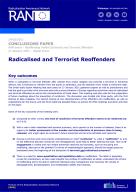Details
- Publication date
- 12 March 2021
- Author
- Directorate-General for Migration and Home Affairs
- RAN Publications Topic
- Prison and probation
Description
When a radicalised or terrorist offender after release from prison relapses and commits a terrorist or extremist offence, this is followed by criticism from the public or politicians, and the attention from media is extremely high. The Small-scale Expert Meeting that took place on 27 January 2021 gathered experts as well as practitioners and had the goal to provide a first overview about the current situation in Europe regarding recidivism rates of radicalised and terrorist offenders as well as the characteristics of these cases.
This meeting was also used for the preparation of future meetings about the prevention of recidivism. The discussion was divided into three parts, with the first looking at data available, the second looking at the characteristics of the offenders and reoffenders, as well as expectations for the future, and the third exploring possible follow-up actions for RAN meetings and other activities on this topic.
Some of the key outcomes of the meeting were:
- Compared to other crimes, the level of recidivism of terrorist offenders seems to be relatively low at 5–8 %.
- With a rise in both radicalised and terrorist prisoners, and a growth in the number of releases, there is an urgency for better assessment of the number and characteristics of prisoners close to being released, who might again be involved in future extremist and terrorist activities and networks.
- Having a common and more precise understanding on what “recidivism” is, what a “reoffender” is, and on the difference between recidivism and reengagement could help to better address the topic. How is reengagement in violent and non-violent extremist networks and activities, such as recruiting and mobilising, also part of the problem? In terms of methodological approach, should the target group be broadened since the beginning of the discussion to terrorist and radicalised prisoners?
- There is a need for more quantitative and qualitative data on reoffenders. The latter is especially crucial for practitioners, as they need insights into profiles of reoffenders to better understand the drivers of reoffending and to be able to optimise individual case management and maximise the results of disengagement, deradicalisation and rehabilitation (DDR) interventions.
This paper summarises the highlights of the discussion as well as the recommendations that were formulated by the participants and will give an outlook on possible follow-up topics.

